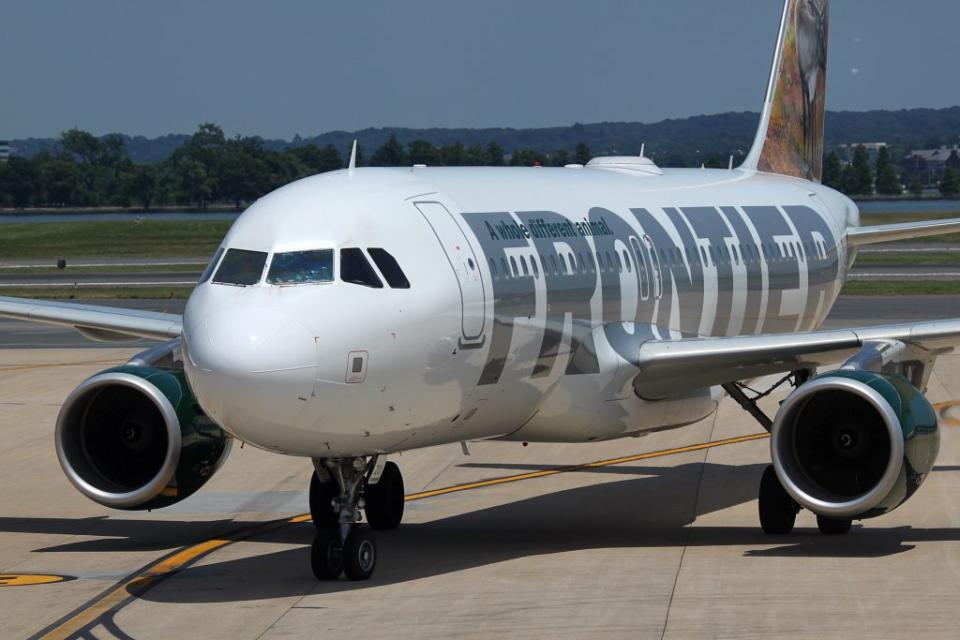Frontier Airlines Says Low-Cost Status Gives It Advantages if Economy Tanks

Frontier Airlines, like rivals Delta Air Lines and United Airlines, acknowledge the airline industry is facing headwinds amid a possible recession. But the company believes its status as a low-cost carrier will help it thrive and overcome an economic slowdown.
“The lowest-cost model … is generally the winner in any recessionary environment,” CEO Barry Biffle said during Frontier’s third-quarter earnings call on Wednesday, citing Southwest Airlines in the 1980s and 1990s and Spirit Airlines during the Great Recession of 2008 as examples.
“Typically, you would find an ultra-low cost carrier, especially ourselves …. to fare most likely the best in a recessionary environment. And part of that is just simple we’ll have the lowest cost, so it’s easier to cover our (expenses).”
Biffle has also viewed Frontier’s status as a budget airline as a competitive advantage. Some airline industry insiders see the carrier benefiting from Spirit choosing to merge with JetBlue Airways in July, after JetBlue and Spirit made takeover offers in February. Biffle said Frontier is poised to profit from travelers turning to the Denver-based airline for less expensive flights after the JetBlue-Spirit deal eliminates Spirit as one of Frontier’s main low-cost competitors.
“Demand for affordable travel is greater than ever with a customer base that has more flexibility and plans to travel more often than they did pre-pandemic,” he said. United executives cited, during their company’s recent third quarter earnings call, the flexibility many consumers have from increasingly popular remote work as a significant factor in surging leisure travel demand.
Biffle added that Frontier has also gotten a boost from strong ancillary revenues, which he said doesn’t fluctuate as much as fare revenue. The carrier generated $78 in ancillary revenue per passenger during the third quarter, a company record. That’s a $3 increase from the previous quarter.
Meanwhile, Biffle downplayed concerns about Frontier experiencing a pilot shortage, an industry-wide issue that has contributed to a large number of flight cancellations and delays this year. He said Frontier’s decision to cut capacity and flying less than planned resulted in the carrier having a surplus of available pilots.
Biffle cited a cadet program it launched in July in partnership with the ATP Flight School as its latest effort to attract pilots, joining its Rotary Transition Program and collaborations with universities. He said Frontier is looking to control the sourcing of its pilots in response to a question from Raymond James airlines analyst Savanthi Syth about whether Frontier was shifting away from regional airlines for pilots. Regional airlines that have long provided major airlines with pilots have been hit by massive pilot shortages.
“We don’t what’s going to happen with regionals and everyone else but we’re putting in programs to ensure that we have a solid supply for years to come,” Biffle said.
Biffle also touched on the possibility of air traffic control staffing issues disrupting Frontier’s flight schedules this weekend. JetBlue President Joanna Geraghty described the air traffic control environment as fragile during her company’s third quarter earnings call earlier this week, adding that a staffing shortage at the Federal Aviation Administration’s center in Jacksonville, Florida could lead to a large number of flight delays and cancellations this winter. Biffle acknowledged those shortages forced Frontier and other airlines to cancel flights to Florida, but he said the company has prepared for the possibility of disruptions.
“We have rejiggered the schedule now,” Biffle said, noting that Frontier has adjusted its itineraries to lessen the risk of air traffic control-caused flight disruptions.
Frontier’s Numbers
Frontier recorded a net income of $31 million during the third quarter, which represents consecutive quarters in the black for the carrier, a pandemic-ear first. Its total operating revenue was up 35 percent from 2019 levels to $906 million while its capacity also increased 8 percent from the same period. The company added its revenue from the first nine months of 2022 has increased 31 percent from pre-Covid levels.
Get breaking travel news and exclusive hotel, airline, and tourism research and insights at Skift.com.
